 “I was 54 not out when the sun vanished”, recounts Mutthu Swamy a 13-year-old boy of Karikkattlu Kuppam village. They were playing cricket on the calm beach – their village pitch, when the tidal waves as high as the coconut trees came crashing, blanking the sunlight. He doesn’t want to remember what happened after that.
“I was 54 not out when the sun vanished”, recounts Mutthu Swamy a 13-year-old boy of Karikkattlu Kuppam village. They were playing cricket on the calm beach – their village pitch, when the tidal waves as high as the coconut trees came crashing, blanking the sunlight. He doesn’t want to remember what happened after that.
Now, he says he will never play cricket on the beach again.
One of the countless scars that the tsunami has left on the young minds of the village children.
Mutthhu Swamy, deservingly hits a huge six across the road, the winning runs of a friendly match between the villagers and the volunteers of the ‘Tsunami Emergency Relief’ (TER). The complete cricket sets that the TER provided to the villagers were inaugurated with a match, with the villagers sitting around the stretch of barren ground, cheering and clapping more for the volunteers than their village team. The cricket matches that they now play all day long has come as a happy relief from the long days of sad memories that they used suffer before the Tibetan volunteers adopted the displaced village.
 Although, completely tired with the day’s hard relief work, the volunteers make sure that in the evenings volleyball matches are arranged, particularly with the elder members of the village. The new nets and balls have come as a good excuse to freely interact with the otherwise quite introvert elder men who still carry the traumatic memories bottled up inside themselves. The eyes that carry the grim scenes of destruction twinkle with delight as the ball rises above the net and bounces off the strong hands of the men hardened with the toils of conquering the oceans. For the time when the match continues, they forget their woes – laughing, patting each others backs, cheering for a better serve. As the matches end the players sit around under the trees talking with each other and the Tibetan volunteers encourage them to win more matches, more important matches against their own fears and depression.
Although, completely tired with the day’s hard relief work, the volunteers make sure that in the evenings volleyball matches are arranged, particularly with the elder members of the village. The new nets and balls have come as a good excuse to freely interact with the otherwise quite introvert elder men who still carry the traumatic memories bottled up inside themselves. The eyes that carry the grim scenes of destruction twinkle with delight as the ball rises above the net and bounces off the strong hands of the men hardened with the toils of conquering the oceans. For the time when the match continues, they forget their woes – laughing, patting each others backs, cheering for a better serve. As the matches end the players sit around under the trees talking with each other and the Tibetan volunteers encourage them to win more matches, more important matches against their own fears and depression.
The TER has been giving special attention to the students of the village, especially those appearing for their class X and XII board examinations. Drawing their attention back to the books from the overwhelming distraction, the TER has provided the students with guidebooks and will be conducting special tuition classes in co-operation with educated Tamils working in nearby towns.
 In large groups of small children the volunteers sit around and teach them poems and rhymes. “Johnny Johnny?” and the group erupts to deafening shouts of “Yes Papa”, clapping with enjoyment at the new knowledge learned. TER has also provided the students with books, pencils, pens, drawing books and colours to bring back the vibrant hues of life into their monotonous lives. The TER has also initiated similar activities at nearby tsunami-affected villages, distributing books and pens at schools, particularly at the temporary school started by the Tibetan volunteers from Varanasi and TSAM.
In large groups of small children the volunteers sit around and teach them poems and rhymes. “Johnny Johnny?” and the group erupts to deafening shouts of “Yes Papa”, clapping with enjoyment at the new knowledge learned. TER has also provided the students with books, pencils, pens, drawing books and colours to bring back the vibrant hues of life into their monotonous lives. The TER has also initiated similar activities at nearby tsunami-affected villages, distributing books and pens at schools, particularly at the temporary school started by the Tibetan volunteers from Varanasi and TSAM.
For the past few days Karikkattlu Kuppam village has been kept awake with the strange sounds of the toys and dolls that have been distributed to the small village children. The children run around pressing the rubber dolls, kicking the balls on the sand and playing with the dolls under the trees. Finding it difficult to get a hard surface to race their cars on, the boys roll them over the tents, flying it in the air, having their fill of imagination.
 As the evenings set in, the villagers gather around the relief tent to enjoy the songs of latest Tamil tunes played from a tape especially bought for the villagers to relax and have their bit of enjoyment. Although the coy women hide behind the darkness of the night, the men and children run to the center of the crowd and dance along with the Tibetan volunteers, encouraging them to chip in and have their stresses eased even if its momentarily.
As the evenings set in, the villagers gather around the relief tent to enjoy the songs of latest Tamil tunes played from a tape especially bought for the villagers to relax and have their bit of enjoyment. Although the coy women hide behind the darkness of the night, the men and children run to the center of the crowd and dance along with the Tibetan volunteers, encouraging them to chip in and have their stresses eased even if its momentarily.
Nights in Karikkattlu Kuppam end in laughter and mirth, felt and shared by everyone, a welcome relief from the scars that the tsunami has left.
The ‘Tsunami Emergency Relief’ is a joint effort of the Namgyal Monastery and the Tibetan Youth Congress.











